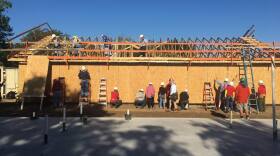A new study shows the harsh impact that growing up in a poor neighborhood has on a kid’s development. Researchers in Texas, Pennsylvania and Wisconsin found the number of children living in high-poverty neighborhoods surged during the Great Recession; from 36 percent of kids in 1998 to 44 percent in 2010.
Rice University sociologist Rachel Kimbro explains why the kids living in those neighborhoods were already a year behind their peers, before even starting school.
Interview Highlights: Rachel Kimbro...
…on why the study looked at 1998-2010: “Our study used two different cohorts of U.S. kindergartners, one who started kindergarten in 1998, and one who started in 2010. Because we had those two cohorts of kindergartners in that time period, it allowed us to look at children’s living circumstances and school readiness both before and after the Great Recession.”
…on why more kids were living in high poverty neighborhoods post-recession: “Families who normally would not live in high poverty neighborhoods either had to move into them because of foreclosure or job loss, or moderate or middle-income neighborhoods became poor neighborhoods because many of the residents lost income.”
…on why kids in poor neighborhoods start kindergarten behind: “We know that there are resources in neighborhoods that are important for child development and that could include things like churches, Head Start centers, or libraries. And so when kids live in neighborhoods that don’t have those kind of resources, that could set them back academically.”
…on how children of color fared in this study: “What we found was that the kids who had the highest gains in terms of living in high poverty neighborhoods were actually white children and children whose families were not poor. But it’s important to remember though that minority children are much more likely to live in high poverty neighborhoods. It’s just that the change during the recession happened to be bigger for white kids and for non-poor kids. High poverty neighborhoods shifted geographically in terms of where they are. So they were no longer concentrated just in urban areas, they spread out more into the South and into the Midwest where the demographics are just different, so it really kind of spread out across the country."






